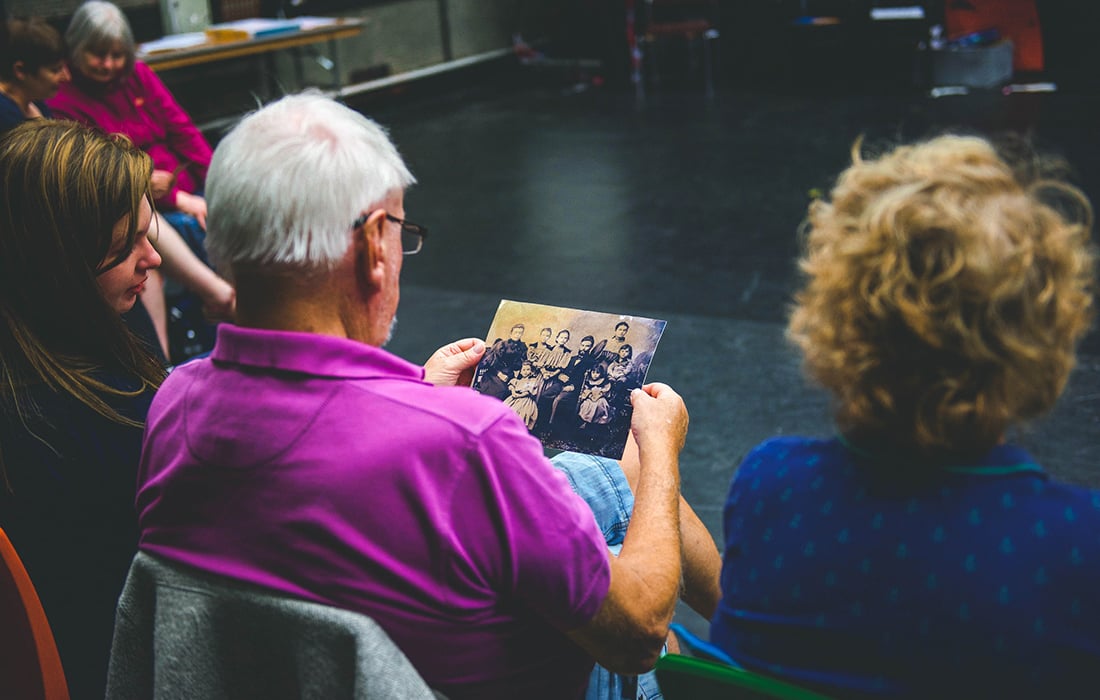
Theatr Clwyd workshops for older people - in a pre-Covid age
On equal footing
The experience of running participatory work online has led Theatr Clwyd to rethink the whole concept of ‘reach’. Let’s use this moment to make the arts truly accessible to all says Gwennan Mair.
Theatr Clwyd has been using the lockdown not only to continue, but also to expand our community work as much as we can. During these isolated times we’ve moved workshops online, running regular theatre making sessions with over 1,000 people a week.
When lockdown started our vision was to maintain our current programme of work within the community and make sure all steps were in place to make sessions as accessible as we could. We’ve had dozens of one to one conversations for technical support; we’ve delivered creative packs; and we’ve involved our wider community in creating rainbow boxes for vulnerable children – all to ensure that people can participate equally.
Our Arts from the Armchair partnership project with Betsi Cadwaladr Health Board has continued supporting people with dementia and their carers, as has our partnership with SORTED (Flintshire drug and alcohol support), working with five vulnerable young women we first encountered through last year’s large scale community production, Mold Riots.
We’ve also started new projects with partners, including Parkinsons UK, Cymru. One of the participants from our Dance and Live Music for Parkinson’s sessions said, "Well worth all your efforts – Dancing For Parkinson’s benefits everyone on so many fronts! Physical and psychological plus all the positives of achieving something and seeing other people in the same situation, and the memories of previous sessions and anticipation for future ones! It’s better than all the medication!”
But another incredible thing has happened with our Parkinson’s project: it’s not only our regular participants that have joined weekly, but 30 people from all over Wales. Sitting alongside our other work, it is making us ask questions about our reach.
The ability to take part in the arts should be available to all people, wherever they are in Wales. We live in a country that ranges from big cities to small rural villages, remote communities by the sea to those in quarry towns stuck in the mountains. Where you are born and what your background is, should not dictate whether you have the chance to fall in love with the arts. Everyone in our nation should have the choice to participate for their own wellbeing if they wish to.
True accessibility
This work is also developing our practice as facilitators. As a trained theatre facilitator myself, I have seen how being creative in a room together can change lives. What we are now seeing with our online sessions is the benefits of people being able to access creativity from their own homes. We take away the exclusivity of being able to travel to a theatre; we take away the cost of a session; and we take away the fear of entering a new space.
I’m not saying this should replace programmes that get people into the same space to feel and share. I will always want to feel the moment within a room, and the moments of sparkle when someone discovers something new about themselves right in front of us. But I do believe this new online form can be a way of reaching new people in ways that are more accessible.
Having said that, true accessibility can only be achieved if we take into consideration that not all people have phones, laptops or access to the internet. If we continue to use online sessions as a way of reaching new people, we have to work together to put things in place to ensure accessibility. This must not be an afterthought – it's essential to any programme otherwise we will end up with the same problem of exclusivity.
Shifting priorities
At the moment participation and engagement is the only thing that’s alive within our theatres. Some people see this as a negative and threatening concept. I see it as an opportunity to shift our priorities within the arts. Participatory arts should be on an equal footing within our theatre buildings and the wider industry. One can't exist without the other.
At Theatr Clwyd we are achieving this equality, and creating a methodology that is shifting things in Flintshire, but such a shift takes patience and time to listen to our communities and develop projects in partnership, to create meaningful and transformational work that can broaden our arts for the future. I want to see one of the young people we support from our SORTED group leading the way for creativity in Wales if they chose to. I want to see the arts belonging to more of our population, whatever the circumstances of their lives. Technology can be used to open the arts wide and together we can make sure that poverty does not exclude anyone from the arts.
Let’s all shift the ecology and use this moment to make the arts truly accessible to all.
Gwennan Mair is Director of Creative Engagement Theatr Clwyd
Join the Discussion
You must be logged in to post a comment.